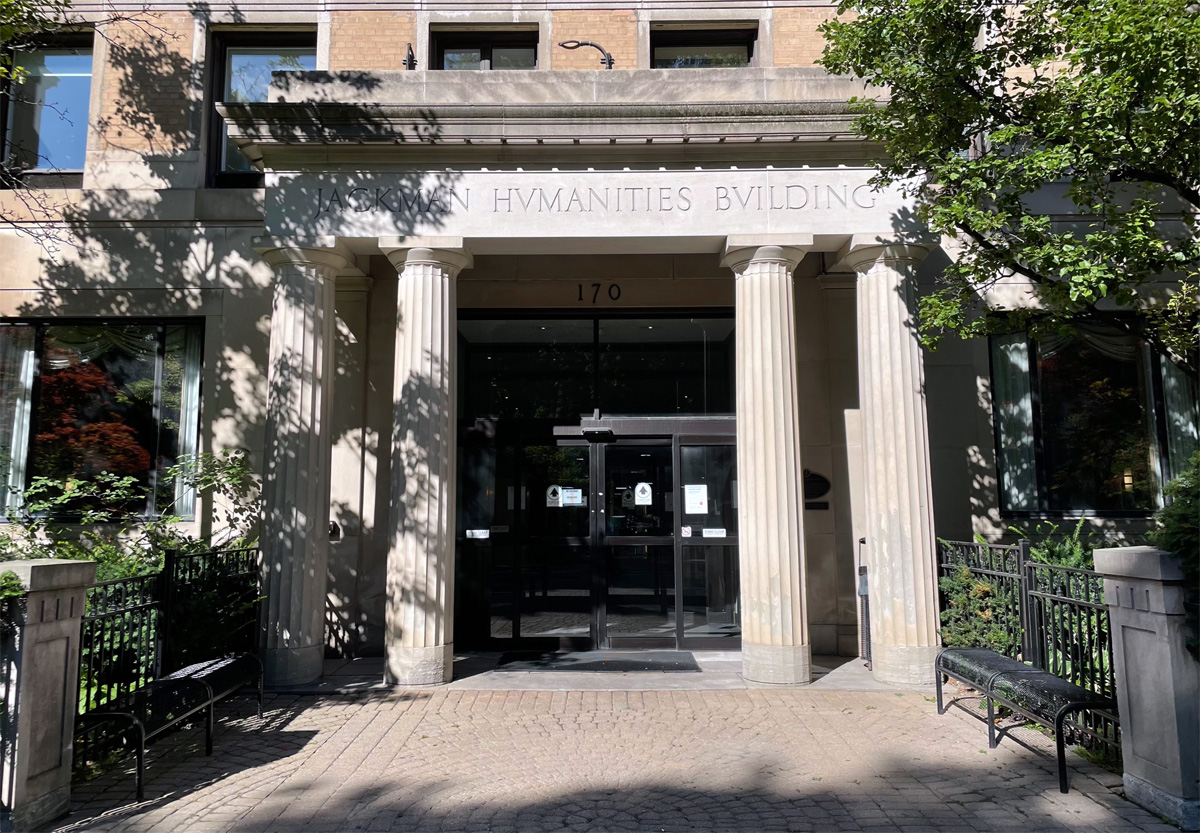Associate Director Kimberley Yates, at the JHI since its inception, reflects on the past 15 years.
In 2002, The Honourable Henry N.R. Jackman made a sizeable donation to the University of Toronto, to be dedicated to supporting research in the humanities disciplines. In 2007, he gave a second donation. The resulting endowment was large enough to support the University of Toronto’s purchase of 170 St. George Street (then called the Medical Arts building and renamed after renovations as The Jackman Humanities Building); to endow multiple Jackman Professorships in the Humanities; and to establish the Jackman Humanities Institute on the 10th floor.
The Jackman Humanities Building houses the Departments of English, Philosophy, and the Study of Religion, as well as the Centre for Diaspora and Transnational Studies, the Anne Tanenbaum Centre for Jewish Studies, the Robert N. Ho Centre for Buddhist Studies, the Institute of Islamic Studies, and the Jackman Humanities Institute. Originally built in 1929, the building was designed by the architectural firms of Marani Lawson & Paisley and Page & Steele. The beautiful Art Deco lobby retains the original colours and ornaments that were there when it opened. The JHI area was redesigned by John Schnier, of Kohn Schnier Architects in 2008. (Fun fact: he also designed the E.J. Pratt library interior.)
There are currently four endowed Jackman Professorships in the Humanities: Thomas Hurka, Chancellor Henry N.R. Jackman Distinguished Professor of Philosophy (the first who was named) and Thomas Keymer (English), Simon Coleman (Study of Religion) and Naomi Seidman (Study of Religion), each of whom hold the title Chancellor Jackman Professor of the Arts.
The Jackman Humanities Institute’s first full year of operation was 2008-2009. In the fifteen years since then, the JHI has hosted a total of 57 12-month Faculty Research Fellows, 58 6-month Faculty Research Fellows, 4 Artists-in-Residence, 6 Distinguished Indigenous Faculty Fellows, 4 Visiting Public Humanities Faculty Fellows, 51 postdoctoral fellows, 51 graduate fellows, and 89 undergraduate fellows – a total of 320 fellows! The JHI has supported hundreds of events through the Program for the Arts and thousands of individual researchers through the Working Groups program. JHI has also helped to start the Critical Digital Humanities Initiative (an ISI-supported research initiative hosted at UTM), the Scholars-in-Residence program (a monthlong research residency for senior undergraduate students that has several hundred participants each year), and a Mellon Foundation funded research collaboration with the University of the Western Cape in South Africa titled Aesthetic Education: A South-North Dialogue, which in turn has spun out multiple collaborative research projects across several disciplines.
The Inaugural Director was Professor Robert Gibbs (Philosophy, 2007-2017) and the current Director is Professor Alison Keith (Classics, 2017). The JHI now has a staff of three fulltime and two part-time employees, three of whom have enjoyed working together since 2008.

The JHI structures all of its activities around a new annual theme each year, and this means that our focus and programming, and even the art that is on display in the Institute’s space, changes every summer.
I have a lot of fond memories! It’s an exciting environment and there is always something new and interesting happening. My favourite theme was 2012-2013 (Food) – we took the fellows out to the Hart House Farm and cooked a feast together. My favourite piece of art was here in 2017-18 when we hosted Alex Janvier’s beautiful painting The Key to Everything, which usually hangs in the Office of the President. I don’t have a favourite fellow: I love them all, and I have a lot of friendships that have developed out of the Circle of Fellows. Perhaps my favourite JHI moment came in October 2020, when we hosted the author Amitav Ghosh, who invited his friend Dipesh Chakrabarty (History and Law, University of Chicago) to the fellows lunch. We were treated to an enormously intellectual and entertaining debate between two brilliant minds in the intimacy of a small seminar, and their conversation touched every fellow’s project in that year on Strange Weather. The pandemic was undeniably hard: we got good at online workshops, but the delights of serendipitous chats and shared meals were irreplaceable. It’s good to be back, and I look forward to many more years.
15 Years of the JHI
July 2022 marked the Jackman Humanities Institute’s 15th year in operation! To celebrate this milestone, Thomas Hurka spoke about “Games and the Good Life” at the inaugural Jackman Lecture in the Humanities in September. If you missed the lecture, the video will be available soon—watch this space!—or you can listen to an interview that Thomas Hurka did recently with CBC Ideas.


